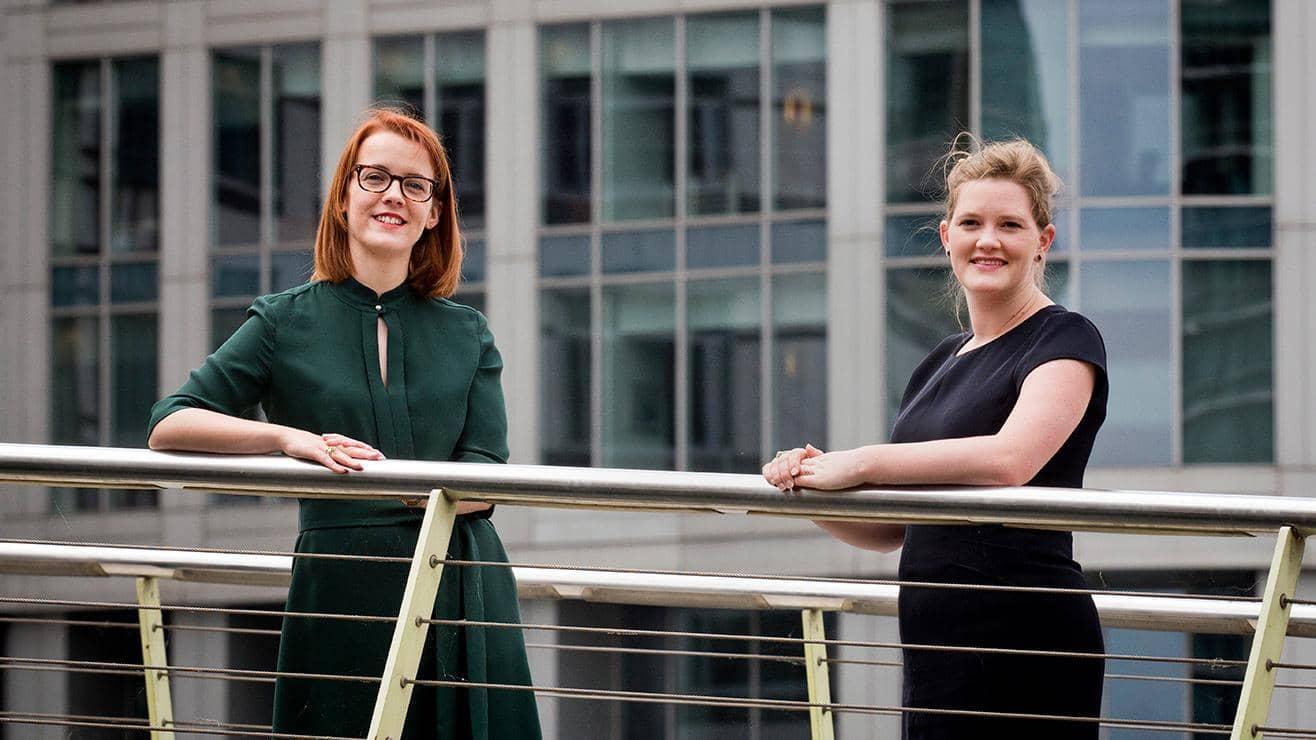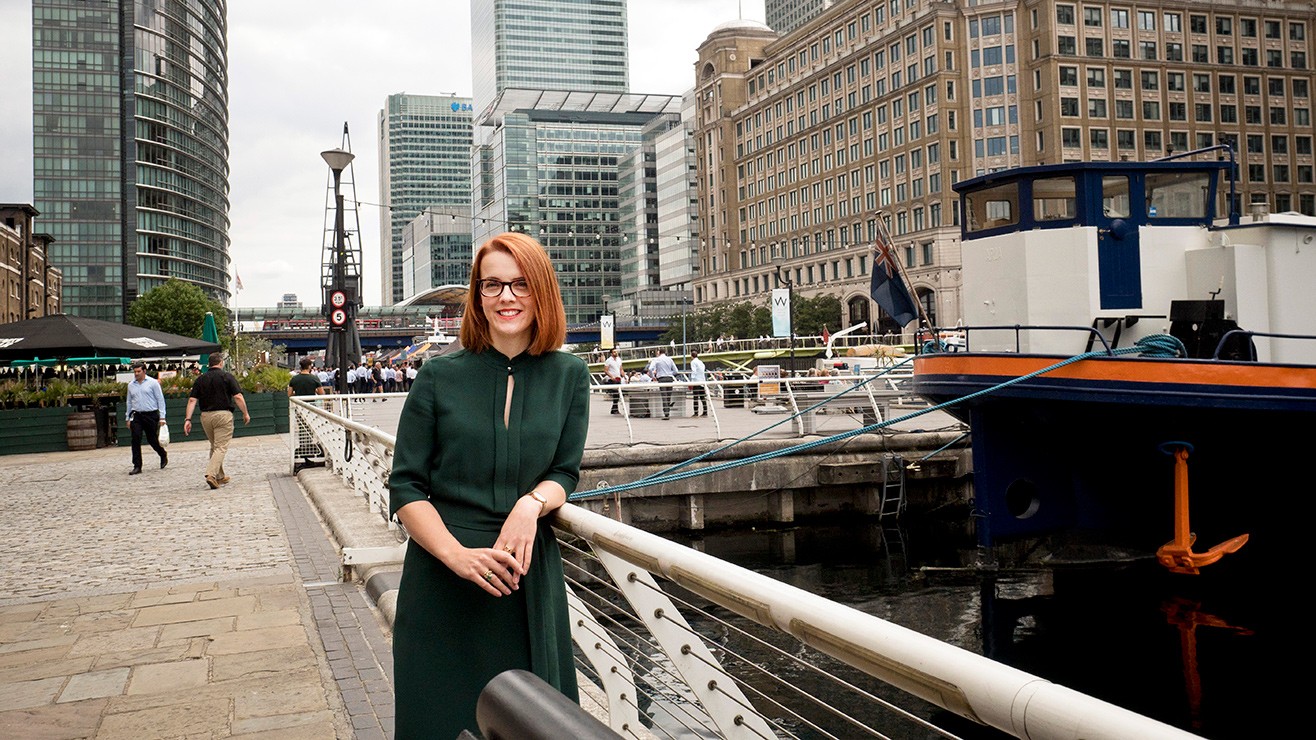
From battlefront to banking
Every year, Barclays supports hundreds of service women and men with their transition back into civilian life. We talk to former Army Captain Sara Mitchell and former Royal Navy Officer Donna Flannagan about swapping their military careers for new opportunities within the bank.
Sara Mitchell and Donna Flannagan were both ready for a career change after serving in the armed forces, but with no prior experience in banking or financial services, they didn’t think the industry was an option.
“I had no intention of going to work in either the financial services or in London,” says former Royal Navy Officer Donna, who spent 16 years in the Navy, serving in the UK and overseas. “It was only because another former Navy colleague of mine told me to come along to this open day at Barclays that I did. I had nothing to lose.”
“As soon as I had my daughter, I wasn’t happy to commit to going on long-term overseas deployment,” adds Sara, a former British Army Captain who served for eight years, including tours of duty in Afghanistan and Germany, before having children. “I didn’t want to be away from home for four or five months in a row anymore.”

Both now have careers at Barclays, thanks to the bank’s Armed Forces Transition, Employment and Resettlement (AFTER) programme, which recognises the value ex-military personnel can bring to the corporate world. The programme helps participants to transition into civilian roles as well as offering ongoing support throughout their careers.
We get a lot of support and guidance
Sara says that her adaptability has been key to her successful career change. “The transition for me has been quite smooth because within the bank, you’ve got quite a large footprint of ex-military employees, so you’ve got a lot of support and guidance,” she says. “Working in the Army, I’ve always been used to moving around and being in a situation where perhaps you don’t know everything.”
Starting a new career can be challenging, but the AFTER programme offers an introduction to every part of the business through internships, work placements and training. “The thing for me that was really interesting was the chance to see different parts of the business of banking” says Donna. “I was apprehensive, there is no denying that. The presentation was just so interesting – it’s that realisation that financial services is so much more than the stereotypes of banking.”
Donna joined the Royal Navy as a Logistics Officer straight from university and, as well as serving on board various ships, later supported RAF Harriers in Afghanistan, deployed to Iraq and Bahrain and coordinated the recruitment of graduate future naval officers.
Along with her administrative responsibilities as a Logistics Officer on board ship, Donna was also responsible for dealing with emergency situations. “One of the secondary roles for a Logistics Officer in war is firefighting and damage control – I was trained to coordinate dealing with the internal battle against fires and floods in order to ensure the ship can carry on fighting the external battle. It’s a very exciting and dynamic role.”

Donna later served in Iraq for six months, where she looked after the wellbeing of military personnel: “I was responsible for helping people in difficult circumstances. So, for example, if somebody had a close family member fall ill or die I’d offer them advice and support and make sure, where possible, they were able to return home to support their family or attend a funeral.”
After leaving the military, Donna started an internship with Barclays and was offered a full-time position as an AVP in Operations Optimisation, after just three weeks. As an optimisation analyst, Donna works on continuous improvements projects for Global Markets Operations, optimising processes to improve such things as the bank’s ability to offer a wider range of options to clients or rates of trade flow to reduce cost to the bank.
“I’ve got a lot of leadership and management experience and that gives me a solid base of confidence,” she says. “I know I can walk into a new situation and I can cope.”
Sara now works in Conduct and Controls at Barclays, where she looks after headcount forecasting, cost management and information record management. Describing the transferable skills that come from being a former servicewoman, she says: “You’re quite used to being in situations where you’re contributing to the bigger end goal, as a team, and I think that the ability to plan your time efficiently and work to strict deadlines were skills that helped me with my transition.”
Donna adds: “In the Army, changing careers every 18 months and being parachuted into new roles that you don’t necessarily understand is fantastic – it’s exactly that kind of scenario that makes you go and talk to people to find out what they are doing, which has been a huge help for me at Barclays.”
I can still pick my daughter up from school
Sara says one of the bank’s biggest strengths in terms of supporting colleagues is its approach to dynamic working. The flexibility means she can work in London, but live with her family in Leicestershire. “I can still do the normal mum type of activities, pick my daughter up from school and perhaps take her to a swimming lesson,” she says.
Donna also has a long commute to get to work and values the option of working from home. “The flexibility is fantastic,” she says. “I work two days a week from home usually and I am flexible with my days. It’s great knowing that I don’t have to do my long commute every day and that if I need to do something, like attend a medical appointment or receive a delivery, I can work really well and be connected without having to go to the office.”
Both women also cite the career progression that’s possible at Barclays. “There is potential to go as far as you want based on talent, ability and personal ambition,” says Donna. “The Navy is very hierarchical and you’ve got to do a certain amount of time in each rank to get to the next one. It’s also very male dominated and at Barclays, I currently have an all-female chain of command, which is fantastic and a real eye-opener.”
Donna’s advice for those seeking a new career having served in the military? “Talk to as many people as possible from different industries – and do it as early as possible. For me, the AFTER programme has been a great experience. It’s been so useful being able to talk to people that have been in the same situation, but also to have contacts who are not ex-military that can explain how everything works.”
Sara agrees. “My biggest tip would be to keep your eyes open,” she says. “Don’t close any industries off, because the stereotypical views that I had about banking or finance were not true. Be open to opportunities and have a look at lots of different places.”
The AFTER programme
Since being set up in 2010, Barclays’ Armed Forces Transition, Employment and Resettlement (AFTER) programme has helped more than 1,000 military veterans every year with their transition to a career in the banking industry. The programme provides work placements, employment opportunities, CV and interview coaching and money management sessions, as well as funding for education and vocational courses for service leavers. Ashok Vaswani, CEO of Barclays UK, says: “I’m proud of the difference we are making to the lives of thousands of ex-service men and women. Barclays’ AFTER programme is helping make the transition to civilian life less challenging.”